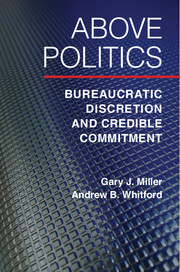Book contents
- Frontmatter
- Contents
- Preface
- Acknowledgments
- 1 Introduction
- 2 The Moral Hazard of Bureaucrats and Politicians
- 3 Political Moral Hazard and Credible Commitment
- 4 Political Moral Hazard and Bureaucratic Autonomy
- 5 “Above Politics”: The Separation of Powers and Bureaucratic Autonomy
- 6 The Control Paradox, Trust, and Leadership
- 7 Professionalism and Credible Commitment
- 8 The Politicization of Financial Regulation
- 9 The Financial Crisis and Reregulation
- 10 Conclusion: The Unraveling of Dodd-Frank
- Works Cited
- Index
- Other books in the series (Series List Continued from page ii)
5 - “Above Politics”: The Separation of Powers and Bureaucratic Autonomy
Published online by Cambridge University Press: 05 May 2016
- Frontmatter
- Contents
- Preface
- Acknowledgments
- 1 Introduction
- 2 The Moral Hazard of Bureaucrats and Politicians
- 3 Political Moral Hazard and Credible Commitment
- 4 Political Moral Hazard and Bureaucratic Autonomy
- 5 “Above Politics”: The Separation of Powers and Bureaucratic Autonomy
- 6 The Control Paradox, Trust, and Leadership
- 7 Professionalism and Credible Commitment
- 8 The Politicization of Financial Regulation
- 9 The Financial Crisis and Reregulation
- 10 Conclusion: The Unraveling of Dodd-Frank
- Works Cited
- Index
- Other books in the series (Series List Continued from page ii)
Summary
What is government itself but the greatest of all reflections on human nature? If men were angels, no government would be necessary. If angels were to govern men, neither external nor internal controls on government would be necessary. In framing a government which is to be administered by men over men, the great difficulty lies in this: you must first enable the government to control the governed; and in the next place oblige it to control itself.
– James Madison in Federalist No. 51 (Madison, 1788)DELEGATION AND STALEMATE
The possibilities for credible commitment, especially in response to morally hazardous incentives for politicians, were discussed in Chapter 3. Chapter 4 discussed the inevitability of moral hazard. We concluded that bureaucratic autonomy may play a constructive role in the creation of credible commitment in a range of policy areas. However, we did not explain why self-interested politicians, infused with moral hazard, would cooperate in the creation of autonomous bureaucracies. After all, it is through their control over bureaucracies that politicians hope to satisfy their electoral and other preferences. Must we then assume that, at the moment of creation, legislators stand down from their selfish interests and make a public-regarding sacrifice of political control to bureaucratic agencies?
The typical explanation for delegation argues that legislators make a calculation about the benefits of gaining expertise in exchange for a loss of authority (Bawn, 1995). There is no doubt that professionalized bureaucracies frequently can bring to bear a degree of expertise that legislators themselves lack. However, Bawn assumes that the delegator is a unitary political actor with no perverse preferences that may distort the tradeoffs chosen by him. This is an unrealistic assumption because, clearly, the separation-of-powers system means that multiple interests are involved in the delegation decision and that the degree of political stalemate in that system may be the determining factor about how much delegation actually takes place. In particular, when conflict is high, there may be more delegation taking place than would be implied by an optimal tradeoff made by a unitary actor between the availability of expertise and the loss of control.
As Moe (1989) argues, the legislative process is much more messy and parochial than the standard model of delegation suggests.
- Type
- Chapter
- Information
- Above PoliticsBureaucratic Discretion and Credible Commitment, pp. 100 - 119Publisher: Cambridge University PressPrint publication year: 2016

